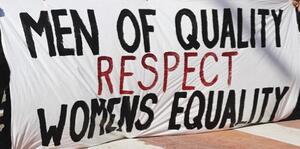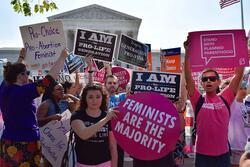Why Feminism Needs Teenage Boys
“I believe in gender equality, but I’m not a feminist.”
Until recently, I saw this statement as a fading murmur in the debate on feminism. If the speaker doesn’t justify their position based on the historic and current injustices perpetrated within the feminist movement, the irony in this sentiment makes it impossible for me to take seriously. As the legendary author bell hooks writes, “feminism is a movement to end sexism, sexist exploitation, and oppression.” Gloria Steinem agrees: “A feminist is anyone who recognizes the equality and full humanity of [every gender].” I’d always assumed the dissociation between gender equality and feminism was an antiquated and unpopular mindset, present only in the era before we had Beyoncé, Chimamanda Ngozi Adichie, and the #MeToo movement.
I was proven very, very wrong.
A few weeks ago, we began a unit on feminism in my English class. Following a lengthy discussion on the definition and importance of 21st-century feminism, my teacher gave us a direction: “Raise your hand if you identify as a feminist.”
I rolled my eyes as I shot my hand into the air. My school has a reputation for being uncompromisingly liberal—usually to a fault—so I was positive every student would agree, bored if not annoyed by the simple question.
All it took was a look around the classroom to shatter my assumptions. While most of the girls in the class had their hands held up as high as my own, we were joined by only one guy. I looked around incredulously at the other boys in my class, all of whom seemed unfazed by what I interpreted as their outright rejection of gender equality.
While my teacher quickly moved on in her lesson, I couldn’t shake the feelings of betrayal and confusion. If these boys weren’t feminists, how could they respect my opinions during class discussions? How could I respect theirs? I needed to know why they hadn’t raised their hands.
I knew now that I had to take action. Before my teacher could begin her lesson the next day, I raised my hand, my question burning in my throat. Trying to calm the shaking in my voice, I asked my peers to explain why they hadn’t identified themselves as feminists, even after we’d so thoroughly discussed its importance.
After an unendurable silence, one of my peers raised his hand. He affirmed his support for gender equality but explained that he didn’t feel he was active enough in the feminist movement to align himself with the title. I could see other boys emphatically nodding their heads in agreement.
I was relieved, yet slightly disturbed, by his response. While these young men assumed they were being respectful to the other feminists by not raising their hands, their inaction actually did more harm than good. They reinforced the pernicious message that feminism is confined to only the “radical” feminists. This line of thinking is what leads people to associate feminists with stereotypes like “bra-burners” and “man-haters,” or with the highly sexist and anti-Semitic term “feminazi.” While some feminists may be burning their bras (a completely respectable form of protest), these generalizations alienate potential feminists who can’t yet see themselves demonstrating in the streets.
The boys in my class created a self-fulfilling prophecy. Their worry over claiming a title because of their lack of action made it impossible for them to take action in the first place. How can someone who doesn’t align with the feminist movement (or any corresponding woman’s movement, like Womanism) donate to causes that overtly label themselves as feminist, like Planned Parenthood or the Jewish Women’s Archive? How can they vote for feminist politicians?
I felt there was one simple thing each of them could do to make a positive change for women around the globe: Call themselves feminists. When young men actively voice their support, they initiate an empowering chain reaction. They legitimize the movement by showing that feminism is supported by all segments of the population, making it easier for other men and women to embrace the label of “feminist.” Additionally, this simple act of allyship would begin to chip away at the media portrayal of teenage boys as sexist, ignorant, and vulgar. As a result, young men as a whole might feel more comfortable disassociating themselves with these tropes.
When teenage boys associate with feminism, their lives are changed for the better. Jessica Valenti, a prolific author on the importance of feminism, writes: “Feminist ideas can help men—be it the rejection of expectations that men be strong and stoic or ending the silence around male victims of sexual violence.” Ending the stigma surrounding men’s emotions liberates them from the prison of toxic masculinity, allowing them to feel happier and healthier.
Unfortunately, misconceptions about feminism exist far beyond the walls of my English classroom. One of the few studies focused on teenagers found that 88% of teenage boys were supporters of gender equality, while only 11% of them actually identified with the term “feminist.” Considering the response from the boys in my own class, this data was unsurprising.
While these trends may seem discouraging, there’s hope yet. These boys are merely feminists who don’t know it yet. With a little education and support, they’ll be reading everyone from Roxane Gay to Margaret Atwood in no time. I’ve seen it on an individual basis already. After the follow-up discussion in my English class, I felt discouraged and perplexed. I sent a text to one of my close guy friends, hoping for some reassurance. “Are you a feminist?” I asked.
He responded within seconds: “Of course.”
This piece was written as part of JWA’s Rising Voices Fellowship.







